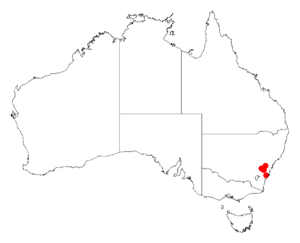Chalker's wattle facts for kids
Quick facts for kids Chalker's wattle |
|
|---|---|
| Scientific classification | |
| Genus: |
Acacia
|
| Species: |
chalkeri
|
 |
|
| Occurrence data from AVH | |
Acacia chalkeri, also known as Chalker's wattle, is a type of shrub. It belongs to a large group of plants called Acacia, which are often known as wattles. This plant is native to parts of eastern Australia.
Contents
What Does Chalker's Wattle Look Like?
Chalker's wattle is a bushy shrub. It usually grows to about 3 meters (nearly 10 feet) tall. Its branches are reddish-brown and have a slightly angled shape.
Leaves and Flowers
The plant has thin, grey-green "leaves" called phyllodes. These phyllodes are shaped like a spear, wider at the tip and narrower at the base. They are about 2.5 to 5.5 centimeters (1 to 2 inches) long. They also have a clear line down the middle.
Chalker's wattle blooms between October and January. It produces bright yellow flowers. These flowers grow in round, dense clusters. Each cluster has about 18 to 23 tiny flowers. Six to eight of these flower clusters grow together.
Seed Pods
After the flowers bloom, long, flat seed pods form. These pods are about 9 centimeters (3.5 inches) long and 5 to 7 millimeters (about 0.2 to 0.3 inches) wide. Inside the pods are shiny black seeds. The seeds are shaped like an oval and are about 4 to 5 millimeters long.
How Was Chalker's Wattle Named?
The plant was first officially described in 1916 by a botanist named Joseph Maiden. A botanist is a scientist who studies plants. He wrote about it in a scientific paper.
The plant's special name, chalkeri, honors Thomas Michael Chalker. He was a caretaker at a place called Wombeyan Caves.
Where Does Chalker's Wattle Grow?
Chalker's wattle is found in a small area in New South Wales, Australia. This area is near the Wombeyan Caves. It grows in shallow soils that are rich in limestone. You can find it in dry, open forests and woodlands.

